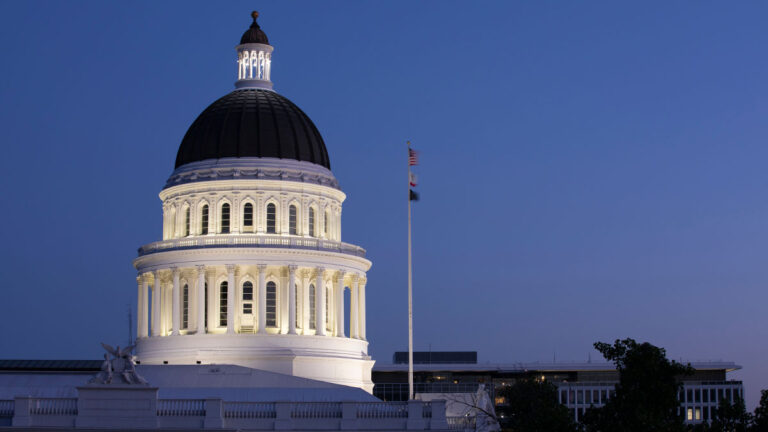
California gaming tribes will have their chance to settle their differences with the state’s cardrooms in court, thanks to the last-minute passage of the Tribal Nations Access to Justice Act (TNAJA). That success marks the culmination of two years of effort to earn the one-time right to sue in state court led by the Viejas Band of Kumeyaay Indians.
In California, tribes hold the exclusive rights to conduct casino gaming in which the player competes against the house. Cardrooms can offer only poker and other card-based games in which players compete amongst themselves. However, many have the word “casino” in their name and offer games that tribes say infringe on their exclusivity.
The problem for the tribes has been that they were legally incapable of challenging those games, and no one else was doing it on their behalf. Tribal sovereignty is a double-edged sword, preventing the tribes from being sued, but also from taking anyone else to court.
TNAJA creates a one-time exception, allowing the state’s tribes to consolidate their complaints into a single lawsuit in the Superior Court of California, County of Sacramento. Once the bill receives the governor’s signature, they will have until April 1, 2025, to do so. There are other conditions attached, as well. For instance, the tribes can’t seek financial compensation or a preliminary injunction and can’t hold the state accountable, only the cardrooms.
The California Gaming Association (CGA) has cried foul, with spokesperson Becky Warren telling Matthew Kredell at Play USA:
We are disappointed that this legislation was rushed through at the last minute, bypassing any Senate committee hearing or transparency. This unfair bill, strongly opposed by public employee unions, firefighters, cities and cardrooms, is a disservice to our communities, harming jobs and resident services.
The CGA has asked Gov. Gavin Newsom to veto the bill, though Kredell rates the chances of this as “unlikely.”
Tribal Nations Access to Justice Act Beats the Buzzer
California’s two-year legislative session came to an end on Saturday, August 31. Despite some movement over the summer, until last week, it looked like TNAJA might have run out of time to cross the finish line.
Instead, a last-minute flurry of activity propelled it through both the Assembly and the Senate in the span of three days. On Thursday, it passed an Assembly floor vote unanimously, 62-0.
Although it began its journey in the Senate as SB549, TSAJA underwent substantial amendments in the Assembly last year. Because of that, it had to go back to the Senate for approval.
On Saturday, in the session’s dying hours, senators approved TNAJA and several other pieces of legislation. Although not quite unanimous, that vote was likewise decisive, with only two Senators opposed and 32 in favor. The nay votes were cast by Sens. Dave Cortese and Bill Dodd, both Democrats.
Getting the bill through the Senate in time meant skipping some of the standard procedural steps, like a committee hearing.
Why Do California Tribes Object to Cardrooms?
Limited access to economic opportunities is a problem for many tribes. In states where they hold exclusive rights to one or more forms of gaming, that tends to become a major revenue stream, crucial to the tribe’s financial wellbeing. As such, they take any threat to that exclusivity very seriously.
At the same time, other gaming interests seek to expand their offerings as much as possible. That’s especially true in casino-adjacent spaces, as those games offer the greatest earning potential.
When California gave the tribes exclusivity over casino games in 2000, it offered cardrooms a compromise. Although the games still had to be player-banked, the new laws expanded the permissible types of games. For instance, cardrooms can now offer versions of blackjack, pai gow and table poker, as long as the house isn’t banking them.
The tribes’ primary objection is to the use of third-party “prop” players to bank the games. Regular players often don’t want to take their turn to be the banker. In part, that’s because of the high potential downside if another player wins a big prize. Cardrooms’ solution has been to use the rules allowing them to hire players (“props”) to fill tables. Tribes say that when those house-employed players are banking the games, it should be seen as equivalent to the house banking the games directly.
This argument has been going on for two decades but came to a head in 2020. When the COVID-19 pandemic forced the commercial cardrooms to shut down temporarily, tribal table game revenue surged before dropping again when they reopened. Seeing how much revenue they were losing to the cardrooms spurred the tribes to press the issue further.
Potential Implications for Online Gambling
Legislators, for their part, mostly just want to see the issue settled. Battles between competing interests—including this dispute between tribes and the cardrooms—have made further progress on gambling legislation difficult.
Therefore, finding a resolution through the judicial system may be a positive step for the chances of online gambling in California.
There are a few caveats, however.
The tribes’ animosity toward the cardrooms is mostly an impediment to the chances of California online poker. Because poker is their focus, including cardrooms in a hypothetical online poker market makes sense. So, tensions between them and the tribes would make negotiating such a bill a dicey proposition. However, the last time California seriously considered that possibility was in 2017.
In 2018, the US Supreme Court struck down the federal prohibition on sports betting. Since then, that’s the gambling expansion topic that has dominated discussions. Cardrooms have no natural reason to be included in such a market. So, the disputes relevant to that effort are those between the tribes and other entities—mostly the online operators forming the Sports Betting Alliance.
Still, one less distraction for the tribes and the legislature might mean more bandwidth to resolve those other issues. However, that requires the legal battle to conclude first. And that, according to Kredell, is likely to take at least four years, since it will almost inevitably go to the state’s Supreme Court.
In that light, the prospect of California online casinos—which hasn’t even been discussed yet—seems impossibly far off. If and when it does come up, however, the final outcome of the tribes’ lawsuit is likely to play a role in the negotiations, one way or another. Learn more about the current state of Californian law and Californian casino bonuses at bonus.com.





